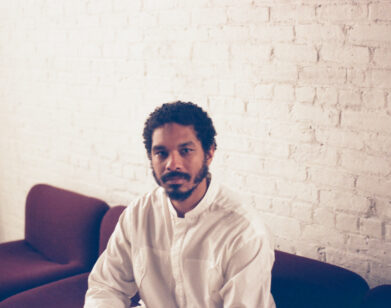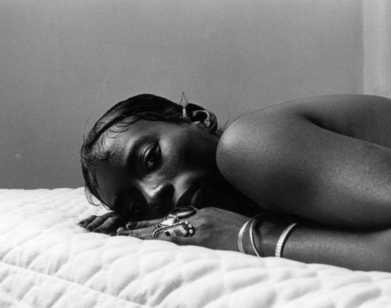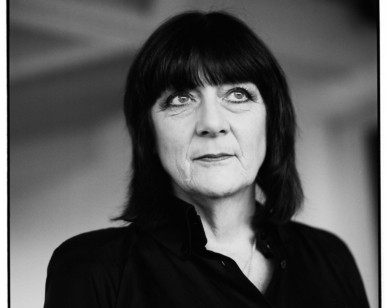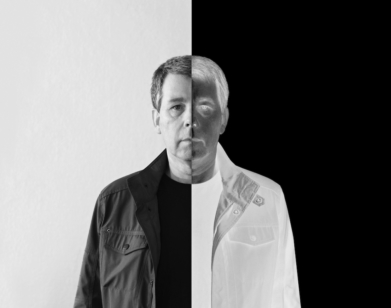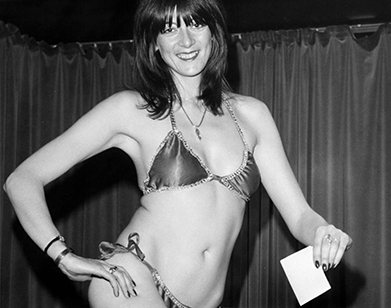Edgy rapper JPEGMAFIA won’t compromise even as he blows up

What’s a better social screed for our time than a fucked up, noisy rap song? And who better to perform such a song than an artist born out of Baltimore riots, a military past, and a healthy respect for anti-establishment legends like Throbbing Gristle and Ice Cube?
Enter JPEGMAFIA, who’s captured the internet’s attention treading ground no other rapper is willing to touch. He’s a master of the eye-grabbing title–2016’s “I Might Vote For Donald Trump” put him on the map as an artist willing to go there, and he’s mocked both the alt-right and icons of mainstream liberal culture. “Be honest,” he asked when we spoke over the phone a few weeks ago, “What other rapper is talking about Lena Dunham?”
On his recent release Veteran, the rapper builds on the style he developed throughout previous mix-tapes Communist Slow Jams and Black Ben Carson. Those tapes coursed with rage at political phenomena like police brutality and the head-spinning election season. On Veteran, he dives back into himself, channeling a countrywide malaise instead of reacting to specific events. Listening to the tape is like being trapped in a cage match within JPEGMAFIA’s mind, where cacophonous samples from video games and pro wrestling share space with barbs aimed at everyone from Bill Maher to Tomi Lahren.
It might sound like heady “political rap,” but JPEGMAFIA has whipped this unlikely recipe into something sharp and listenable. The tape’s blown up, and the rapper has moved from calling out large media outlets (“Pitchfork told me never be abusive/unless I’m moving units,” he rapped on the Veteran cut “Whole Foods,” a reference to the outlet’s spotty history of covering hip-hop) to emerging as a critical darling within the span of a few weeks, including a glowing Pitchfork review. We talked about what that change means, and how his remarkable life has prepared him for a breakthrough.
JAMES JOHNSON: You’ve been putting out albums for the past couple years. Why is it popping off now?
JPEGMAFIA: I didn’t do anything different! I’m talking about the same thing I’ve always talked about. I think I’ve just been me long enough. When you’re you long enough, you get to this space where people start respecting you. People just came around. Do you remember a time in the 90’s when Diddy didn’t have any respect from the hip-hop community or anything? It was just, Oh, Puff Daddy, the dude that samples old songs. And now, he’s Diddy the billionaire, who no one plays with. He just did it being himself. Not to compare myself to Diddy. I am not in that tax bracket. But I think it’s just perseverance, and everyone just caught up.
JOHNSON: What are some firsts over the past few weeks?
JPEGMAFIA: Being in Pitchfork. Never in my entire life did I think they would ever acknowledge me in any way that wasn’t either backhanded or negative. I think them giving me a best new track was one of the most shocking things I’ve ever seen in my life. That’s an out-of-body experience. I’m just so prepared for hate all the time, that when love comes I don’t even know what to do with that.
JOHNSON: Ok, so going way back, you’re associated with the Baltimore scene, you now live in LA, but you grew up in New York. Did you have any engagement with hip hop while you were living there?
JPEGMAFIA: I lived in New York until I was around 12 to 13. But no, not at that time. My mother was just keeping me out of street shit, that’s what we were surrounded by. I had more of a relationship to the street shit, street politics, selling crack, gangbanger shit. I loved music though, period. My dad used to play old dancehall records—Cutty Ranks, Ranking Dread, Michael Prophet, these type of dudes. I loved music, but my relationship with hip hop wasn’t fully developed yet.
JOHNSON: Then you moved to Alabama.
JPEGMAFIA: That’s where I had to deal with a lot of deep-rooted racism, head-on, at the age of 12. No one helped me through it. A lot of the time I was isolated. It was then I developed a relationship with hip hop. Listening to Diplomatic Immunity, I’d spend a lot of time trying to figure out how they made those chipmunk sounds, and I was like oh, they make them by using other records. Oh, that’s what sampling is. Just figuring things out. Being an isolated and being an outsider gave me a brief opportunity to brush up, learn and gather the influences that come out now.
JOHNSON: If you’re riding around in Alabama, in high school, what are you listening to?
JPEGMAFIA: I had a friend that would put me on to Diplomats, he was on the tip of Project Pat, Three 6 Mafia, Kingpin Skinny Pimp, Lil Wyte. I would listen to whatever he was listening to, then go find other shit. I was also angry and upset, from all this racist shit, so I’d also listen to Bad Brains, Fear, Black Flag. It matched the intensity of how I felt.
JOHNSON: After high school, you joined the Air Force. Is that a decision you regret?
JPEGMAFIA: My mindset was, what else am I gonna do? I was in deep south Alabama. I would’ve just ended up doing something dumb because I was broke. The military is an enticing option to a lot of young people in that position. Our parents can’t pay for college, can’t just send us somewhere and just pay for us to fuck up until we figure out what we wanna do. So we had to figure it out right then and there. I said, I’m gonna do my 4 years, then I’m gonna get the fuck out of here. Whatever money I get I’m gonna spend it on music equipment and I’m gonna work my ass off producing. I had been producing since about 14, once I figured out what sampling was. But when I was in the military, I was like fuck this shit, it’s time to become the best.
JOHNSON: The military seems like its own little bubble that we never get a window into—were there other people into music like you were?
JPEGMAFIA: Other people in there wanted to do music just to be cool, but for me, I knew I was gonna get the fuck out of there and do it dead seriously. If it wasn’t for that, I would’ve bludgeoned someone or end up in military jail. I had to think like that. It’s not like a normal job. You can’t leave. If you suck at your job, normally, you’d just get fired. In the military, they’re gonna make your life a living hell. And then they’re gonna put you in an even shittier job and make it worse. And you’re just gonna have to deal with it until your contract runs out, otherwise you can go to military jail.
I am the same person I was in the military, so that caused a lot of problems. Everything works on rank. If you’re higher ranking, you can basically do whatever the fuck you want. I saw a guy beat his wife in her sleep, and come back the next week. I was looking at him like, “Nobody saw this nigga in the paper last week, beating up his wife? He’s here again? Okay, that’s cool.” Like, what the fuck! And if you question it, they’re like, “You don’t get it, you’re not part of the community.” It’s some cop shit. There were so many nights that my love of music kept me alive through the military.

IMAGE COURTESY OF WON80EIGHTY
JOHNSON: Do you keep in touch with anyone from that time period?
JPEGMAFIA: No. I don’t want to talk to them. And if they want to talk to me, I want them to see this and be like… No. Kill yourself. They know the type of people they are. They know exactly what they did, what they tried to do to me, they know the people they protected. I got nothing to say to them. And if they have anything to say to me, or want to say about me, I have no problems letting the whole fucking world know what y’all was doing. So we don’t speak, and we’re not going to speak.
JOHNSON: I read you moved to Baltimore initially because you were just a fan of the music scene there. How did you find that, just over the internet?
JPEGMAFIA: After the military, I floundered around between jobs for a while, and there was an opportunity for me to go live in Japan. I was living on the Okinawa Airport Base, off the grid, no real address. I had a little band. I lived there for close to a year, and when I was coming back to the states I wanted to do the music thing full time, no holding back. I was trying to figure out where I should go, where’s a good scene for me to fit in. I was coming back talking about political shit, racially charged shit. So where do I move? I started looking at the Baltimore scene. They just had this black rage there, people like Abdu Ali. The Baltimore scene just matched what I was doing. I loved everything about it, and I wanted to be a part of it.
JOHNSON: On Black Ben Carson, you’re responding directly to the deaths of young black men. What’s the animating force behind this project?
JPEGMAFIA: It’s the same energy, I’m just bringing it out in different ways. On Black Ben Carson, I had strict no melody thing. I wanted straight, raw, rugged noise music. I wanted you to hear this shit and fuck your head up. On Veteran, I’m still doing that, but it’s me being the most “me” I can possibly be. It’s more representative of how my brain works. There’s smooth and harsh stuff, encompassing all sides of me rather than just one. Black Ben Carson is me when I’m upset. I was pissed, and I still am pissed, about niggas dying every day! They shot a 12-year-old kid, Tamir Rice.
On this one, I’m bringing the same energy, but more inspired by the eccentric black people that are more invisible. I’m inspired by those motherfuckers that grew up in the projects but they listen to Throbbing Gristle… but they’re not no corny motherfucker.
JOHNSON: On this project you’ve gotten a lot of attention for specific callouts, including Lena Dunham. What do these people represent to you?
JPEGMAFIA: Lena Dunham is just the stereotypical liberal. On the surface she portrays herself like she’s carrying the torch, but she’s not. She’s just as racist as these Republican motherfuckers, and proves it over and over with the little shit she does.
People like her represent a bigger, wider problem. I like to point out hypocrisy on both sides. So I use people like Lena Dunham, Amy Schumer, someone like that, because I want to put their name out there in a negative context to show that I’m onto you, and I’m not with that shit at all. It’s less about them specifically, and more about this gross part of white culture that I hate and never gets any attention.
JOHNSON: With how you’re referencing such recent, specific events, I have to ask… Are you the most engaged rapper ever? It’s like the old adage of hip hop being the CNN of the streets, adapted for the Twitter era.
JPEGMAFIA: No one else even thought about this shit! Come on yo! Y’all got the same internet I got. I’m just the only nigga that uses it to say anything. Either people just don’t care or they just don’t think to. Honestly, if Ice Cube were around in this era, he’d probably be doing something similar. Because that’s what he was to me in the 90’s. He’d say shit like this, maybe not as specific as I go. But me calling out things that are very recent, being that engaged, is more of a testament to me being a child of the internet.
JOHNSON: Do you feel any disconnect with your white fans, given your subject matter?
JPEGMAFIA: I’m gonna break this down once and for all. America has about 300 million people in it. Fourteen percent of those people are black. Something like 70 percent of America is white. That’s why I have such a big white fanbase, cause it’s fucking mad white people here! I hate when people be like, you talk all this shit but your fanbase is white. Bitch, everybody’s fanbase is white, except Tank! Except Madea! Get the fuck out of here! This is a numbers game.
JOHNSON: With your callouts of media sites and bloggers, it raises the question: in your mind, who should be writing about music?
JPEGMAFIA: Look, I don’t have any problem with anyone writing about music. I love that people can write whatever they want. When people were saying Pitchfork shouldn’t report on black music, I don’t necessarily agree with that. My problem is with the absurd amount of power that these places have. It feels very demoralizing to me that as an artist coming up, they have to beg Pitchfork to be on their thing. At the end of the day, who works for Pitchfork? Do they make music? Do they make good music? Why are they the authority on that? At any job, they require your resume, some reason for you to be at the top. It’s just like, who the fuck put these niggas at the top? I want people out of these rudimentary ways of thinking, like they have to beg these places to get on.
JOHNSON: Now these outlets are coming to you, how do you navigate the new attention?
JPEGMAFIA: The thing I keep in mind is at any moment these niggas could decide you’re not hot any more.
JPEGMAFIA’S MOST RECENT ALBUM VETERAN IS OUT NOW.


